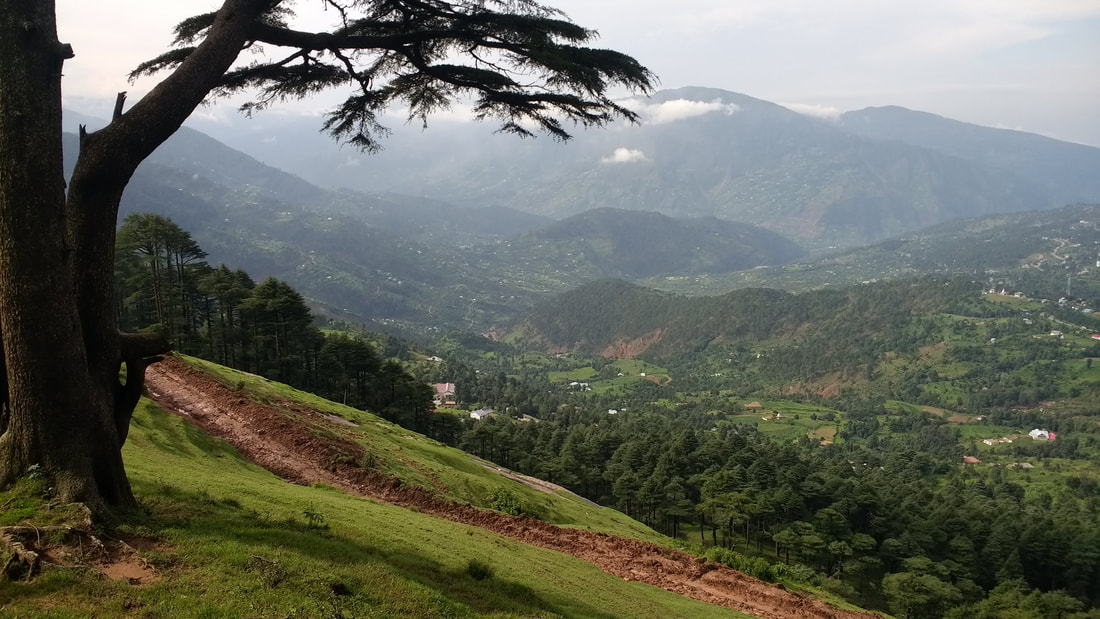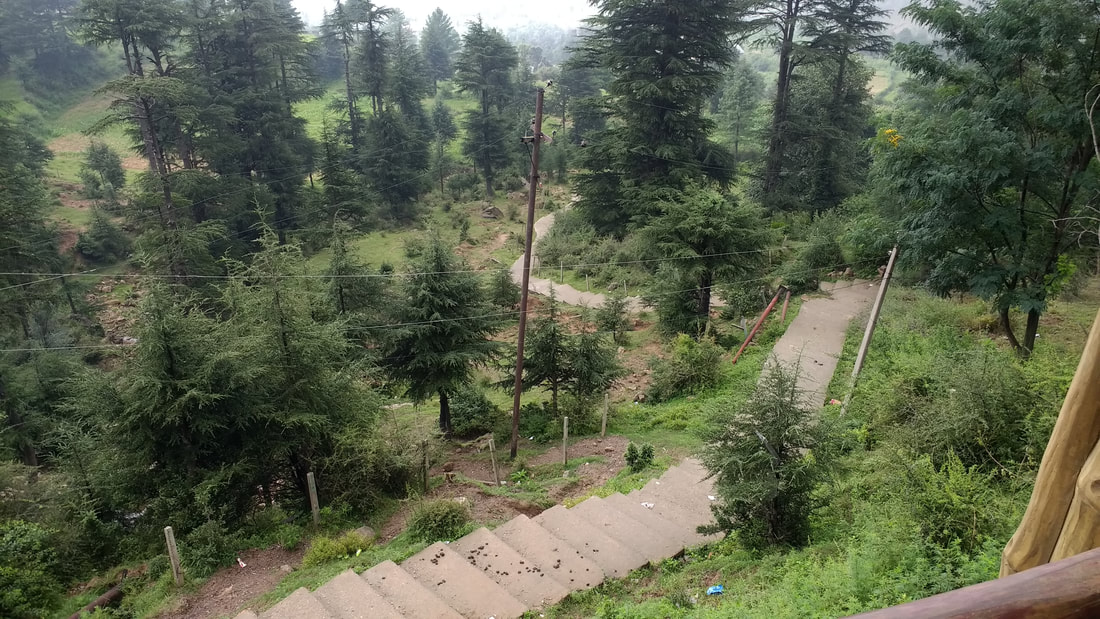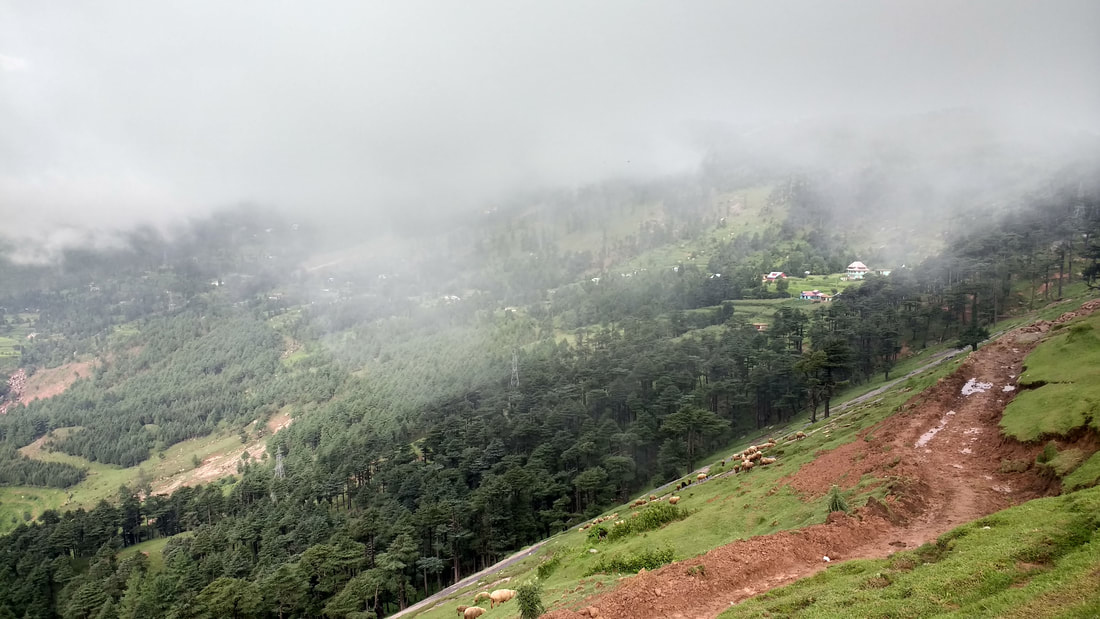|
“It is not too far,” he repeats what has now become a joke for us weaklings “from the plains”, as the locals love to put it. And he goes on to add a new one, “I will take you back by an easy route”. Hah! I was part of a film crew to document the lives of farmers on the mountain slopes in Pachote, Jammu. Someone had warned us that it was not a good idea to travel there during the rains, leave alone shoot. There were under-the-breath warnings, too, to watch out for terrorists. On day one, when we got off the car and took a few steps towards our first location, I did experience terror, albeit a more down-to-earth kind. Because I was down on earth having lost my footing. We were on the path to a farmer’s place, except that there was no path. Just slippery smooth mud shining in mischief, stones waiting for a foot to step on them to start rolling and treacherous plants with long thorns that offered the only possible desperate grab-hold to arrest your free fall. This was to become our way of life for the next five days. If the farmers tell you the descent is easier, they are not telling you about the effect of gravity on a near-ninety-degree slope after your shoes seem to have forgotten all about traction and are just clinging to your feet to save their own lives. If they tell you the ascent is easier, they are ignoring the panting connection between your creaking knees and your heaving lungs, after about five hops from one jutting bit of stone to a clump of grass that may cushion your fall or open a hidden portal to the raging river far, far below, which you can’t see thanks to the thick fog. We were about to pack up at the end of day four, having lost several frustrating hours to the rain and fog when he offered to take me first to the blessed car on a heavenly, level, firm road, somewhere up in the sky from where I looked. I abandoned all feelings of camaraderie towards the rest of the crew and immediately accepted. I counted on them to understand that when the going gets slippery, the old get to go first. Lend me your hand, leader He is no ordinary farmer; he is an exceptionally successful one. He is also the sarpanch of the area, which essentially makes him the prime minister if that small panchayat were a country. He makes three offers right at the outset. We will go at an easy pace. You can hold my hand whenever you want. We will rest as many times as you want. My male ego cringes when I accept all three. When the mind is full of fear and the head is held low for fear of missing the next step, the ego quickly learns to shut up. Here I am, walking with the king of all that the fog lets us survey at that moment. And he is spending all his time escorting me to the safety of the car. Surely, as a leader, when you walk around you must have your retinue (security and yes-men) with you? “What for? I walk these paths any time of the day or night. Alone!” I am not worried about your getting lost. Surely, you must be concerned about security, I ask, warily eyeing a vague dark shape moving towards us in the haze. That turns out to be cowherd, followed by someone who must be his wife. Tied securely to the back of the woman is a baby, fast asleep. As he steers me gently away from the horns of the nervous cow, my guide has a little conversation with them. I can make out that they are very respectfully explaining why they were late and, probably assuring my friend that the road ahead was all clear. It does not appear to be a casual hello, he seems to know their names. “Security?” He returns to my question. “Why do I need security when I am with my people? I was a farmer like most people here and I still am. Then I started a taxi service and did what I could to help people here. They asked me to stand for election because they thought I could help them solve some of their problems. They are the ones who elected me to be their sarpanch. Why do I need protection to be with them?” But, you know, how politicians …. “I am not into politics. We have many problems here. I have helped my people solve some. We are working to solve the rest.” As he talks and I pant up a mercifully stone-paved portion of the path, we run into several other villagers. The same scene repeats. A brief halt, a little conversation. By now, I am convinced he knows almost everyone around. Even the sceptical journalist in me is silenced when he translates the conversations. His concern is for real; so is their respect. Did they give you some sort of ID when you became sarpanch? “Of course,” he fishes out a card from his pocket. According to the ID, his tenure had ended six months ago. “I am an ex now,” he calmly put the card back. “They postponed the election for some reason. And these people want me to fight the election again whenever it happens.” There is no trace of pride. “Leaders from other panchayats ask me why I continue to work when my term is over.” Why do you? “You people have come all the way from Maharashtra to help us. I am right here. Why can’t I help them? What has it got to do with my position? How does it matter if am an ex?” He gets a little worked up. I gesture to him that I would like to sit down for the umpteenth time. There is a nip in the air; the fog is getting even thicker. But, I am sweating profusely. I can see him watching me closely. Must be wondering, is this guy just tired or is he getting a heart attack? He decides to cheer me up. “What is left ahead is less than what we have left behind.” That sounds so profound and so politically correct, I think. Then I will my knees to carry me again. Being a benevolent bridge
Just when my lungs are to ready give me a lockdown notice, he points to a building that emerged from the fog on the left. “This is the school where I studied. It was just a primary school. I made it bigger. Now children can finish their education here. They don’t have to give up or go away.” So, you concretized this path to make it easy for the children? “This is the only path the children have,” he justified. “And that shed you see,” we are almost on the road. “We used to wait near the road as children but there was no shelter from the rain and snow. So, I made that shed.” No, he did not spend from his pocket. He explains that the government has enough schemes for the people. But you can’t expect the government to take the first step; and the people just don’t know. His job is to shatter the reluctance at one end and the ignorance at the other. That is how he managed to get a roof over the heads of many helpless women farmers and got them the benefit of government schemes (ranging from food to jobs). He is quite capable of spanking the law too. Like when the bureaucracy mulishly refused to complete a small stretch of road the villagers desperately needed, he spurred the villagers to do it themselves in just one night. In the morning when the law came for him, he was right there and so were the villagers. Bureaucracy had to bow and retreat. As I collapse on one of the benches under “his” shed, he asks the driver to get water. After several long moments, when I feel strong enough to talk and walk, he tells me he would be getting off on the way. The driver stops at a spot that has no sign of civilisation. Except for the fog, I cannot see a thing. My friend gets off, waves me goodbye, simply steps off the road and vanishes. I look at the driver for assurance. “Don’t worry, he knows the way.” How long would it take him to reach home? “About 45 minutes,” he shrugs. That was almost a month ago. I hear he rallied the villagers once again, for another road. And that he has been invited by the government to speak on how he managed to make the most of government schemes and corporate funds to inspire his fellow villagers reap a rich harvest they had never thought possible. Dear Parkash Chand, we need more of you to guide us through treacherous slopes. And to reassure us that what is ahead is less worrying than that we have covered.
6 Comments
|
AuthorVijayakumar Kotteri Categories
All
Archives
July 2024
|




 RSS Feed
RSS Feed

